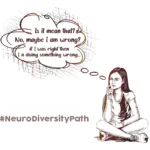A Journey of Growth and Resilience
Parenting with ADHD presents its own set of challenges and triumphs. It’s important to acknowledge and embrace your unique experience as a parent with ADHD. Recognize that you are not alone in this journey; there is strength in seeking support and connection with others who understand. Embrace your strengths and challenges, and remember that you can grow and be resilient in adversity.

Nurturing Self-Compassion
Practice self-compassion as you navigate the ups and downs of parenting with ADHD. Be gentle with yourself and acknowledge that it’s okay to make mistakes. Forgive yourself for past shortcomings and focus on learning and growth moving forward. Cultivate a mindset of kindness and understanding towards yourself, knowing that you are doing the best you can in challenging circumstances.
Seeking Support and Resources
Seek out support from friends, family, or support groups for parents with ADHD. Connect with mental health professionals who can provide guidance and resources tailored to your needs. Explore educational materials and books on parenting with ADHD to gain insights and strategies for success. Remember that asking for help is a sign of strength, and you deserve support as you navigate the journey of parenthood with ADHD.
Building Strong Relationships with Your Child
Make quality time with your child a priority in your daily routine. Engage in activities you enjoy and create bonding and connection opportunities. Listen actively to your child’s thoughts, feelings, and experiences, and validate their emotions with empathy and understanding. Demonstrate your love and support through words and actions and reassure your child of your unwavering commitment to their well-being.
Create a safe and supportive environment where open communication is encouraged. Encourage your child to express themselves freely and honestly and validate their perspective even if you disagree. Be an active listener, showing genuine interest in what your child has to say and responding with empathy and respect. Model healthy communication by expressing your own thoughts and feelings openly and constructively.
Build trust and connection with your child through consistency, reliability, and authenticity. Follow through on your commitments and be dependable in your actions. Honor your child’s trust by respecting their boundaries and privacy. Celebrate their achievements and support them through challenges, showing them they can always count on you for guidance and support. By prioritizing quality time, fostering open communication, and establishing trust and connection, you can build strong and lasting relationships with your child despite the challenges of parenting with ADHD.
Navigating Challenges with Openness and Understanding
Acknowledge and address the challenges that may arise in parenting with ADHD with openness and honesty. Be proactive in identifying potential difficulties and seek support when needed. Communicate openly with your child about your ADHD and how it may impact your parenting, encouraging dialogue and understanding.
Involve your child in problem-solving and decision-making processes, empowering them to contribute to solutions that work for both of you. Listen to their concerns and validate their perspectives, working together to find mutually beneficial resolutions.
Consider seeking guidance from mental health professionals who specialize in ADHD or family therapy. Professional support can provide valuable insights, strategies, and resources to help you navigate the challenges of parenting with ADHD. Attend therapy sessions as a family, learning and growing together in a supportive and understanding environment. By recognizing difficulties, engaging in collaborative problem-solving, and seeking professional guidance, you can navigate the challenges of parenting with ADHD with openness and understanding, fostering stronger relationships with your child.
Cultivating Kindness Towards Yourself
Practice self-compassion as a parent with ADHD, acknowledging that you are doing your best in challenging circumstances. Research by Dr. Kristin Neff, a pioneer in self-compassion, highlights the importance of treating oneself with kindness and understanding. Be mindful of your self-talk and challenge negative thoughts with self-compassionate language. Offer yourself the same grace and forgiveness you would extend to others facing similar challenges. Prioritize self-care and make time for activities that nourish your well-being. Remember that taking care of yourself is not selfish but a necessary component of effective parenting. By cultivating kindness towards yourself, you can foster resilience and well-being, setting a positive example for your child.
Supporting Your Child’s Development and Confidence
Encouraging Independence and Autonomy
Empower your child to take ownership of their actions and decisions, encouraging independence and fostering autonomy. Provide opportunities for them to problem-solve and make choices, celebrating their successes and offering guidance through challenges. Trust in their abilities and offer praise and encouragement to build their confidence.
Fostering Growth Mindset
Cultivate a growth mindset in your child by praising effort and persistence rather than innate abilities. Encourage them to view challenges as opportunities for learning and growth, celebrating progress and highlighting their strengths along the way. Model a positive attitude towards setbacks and failures, demonstrating resilience and perseverance in the face of adversity.
Providing Emotional Support
Offer emotional support to your child by being present and attentive to their needs. Listen empathetically to their concerns and validate their feelings with understanding and compassion. Offer reassurance and be a source of comfort during difficult times, showing unconditional love and support. By encouraging independence, fostering a growth mindset, and providing emotional support, you can help nurture your child’s development and confidence as they navigate the challenges of growing up.
Strategies for Parenting Success with ADHD
Establishing Routines and Structure
Create routines and structure in your daily life to help manage the challenges of parenting with ADHD. Establish consistent meal times, bedtime routines, and daily schedules to provide stability and predictability for you and your child. Use visual aids such as charts or calendars to help reinforce routines and keep track of tasks and responsibilities. Stick to a regular routine as much as possible, but also be flexible and adapt when needed.
Utilizing Organizational Tools and Strategies
Utilize organizational tools and strategies to help manage time, tasks, and responsibilities effectively. Use planners, calendars, or apps to keep track of appointments, deadlines, and commitments. Break tasks into smaller, manageable steps to avoid feeling overwhelmed, and prioritize tasks based on importance and urgency. Set reminders and establish systems for organizing paperwork, bills, and household chores to stay on top of responsibilities. By establishing routines and structure and utilizing organizational tools and strategies, you can navigate the challenges of parenting with ADHD more effectively and set yourself up for success.
“Parenting is about guiding the next generation, and forgiving the last.“
— Peter Krause
In conclusion, parenting with ADHD presents its unique set of challenges, but it’s also a journey filled with growth, resilience, and moments of joy. We can navigate these challenges with grace and understanding by embracing self-compassion, fostering open communication, and prioritizing connection with our children. It’s essential to remember that we are not alone in this journey and that seeking support from others and within ourselves is a sign of strength, not weakness. As we continue cultivating kindness towards ourselves and supporting our children’s development and confidence, we lay the foundation for strong, resilient families. Let’s embark on this journey together, embracing our strengths and challenges and celebrating the beauty of parenting with ADHD.
What are your thoughts on parenting with ADHD? Share your experiences and insights in the comments below. Let’s support each other and learn from each other!





